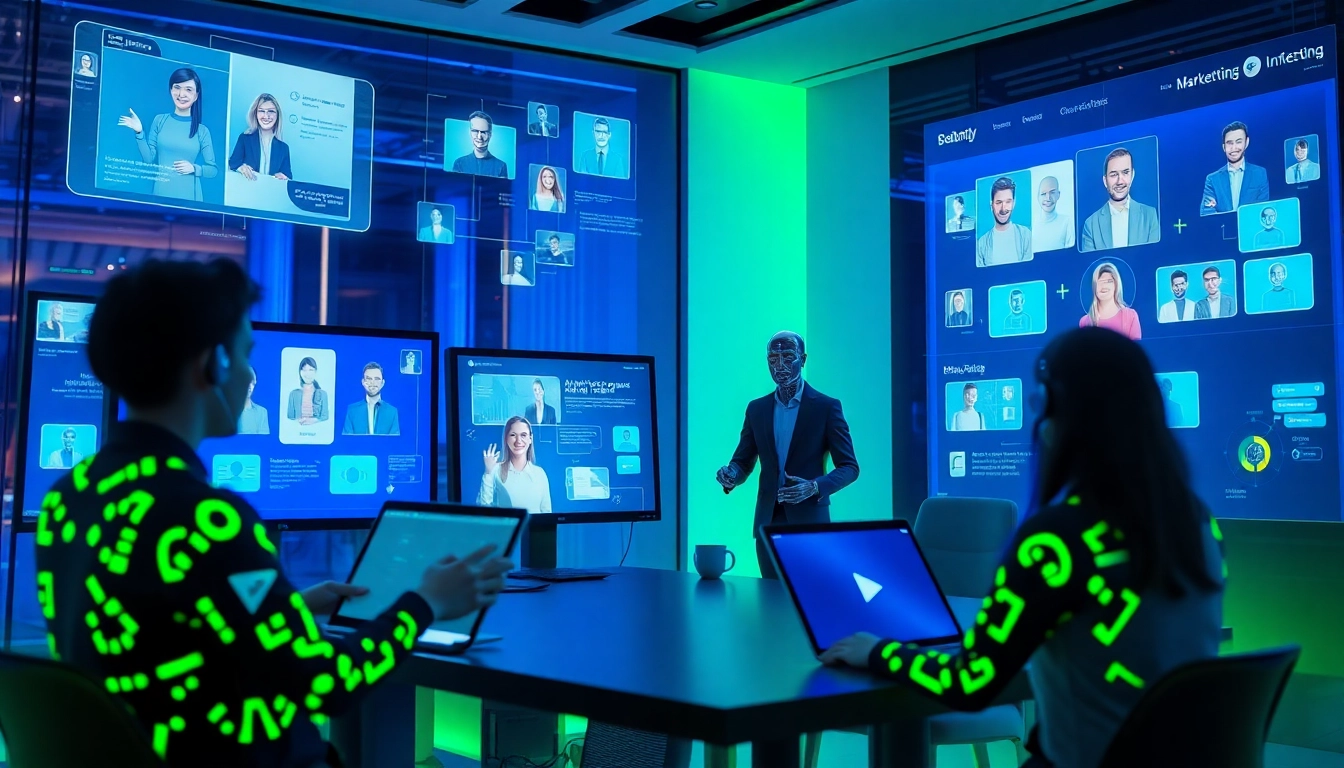Understanding AI Marketing Agents
What Are AI Marketing Agents?
AI marketing agents are sophisticated tools powered by artificial intelligence that enable businesses to automate and enhance their marketing strategies. These agents use algorithms and data analytics to streamline marketing processes, from the initial conception of a campaign to its execution and evaluation. They analyze consumer behavior, segment audiences, and optimize content delivery, significantly improving efficiency and effectiveness.
The ability to integrate these agents with current technology systems allows businesses to connect various aspects of their marketing strategy. For instance, AI marketing agents can be incorporated into Customer Relationship Management (CRM) platforms, social media tools, and digital advertising programs, creating a cohesive marketing infrastructure.
How They Work in Digital Marketing
The operation of AI marketing agents is rooted in machine learning and big data analytics. Firstly, these agents collect large volumes of data from various sources such as social media, website interactions, and market research. By analyzing this data, they can identify patterns and trends that inform marketing strategies.
One common application involves predictive analytics, where AI marketing agents forecast customer behavior based on historical data, allowing marketers to tailor their campaigns for higher relevance and effectiveness. Furthermore, agents can execute marketing tasks autonomously, such as sending emails or posting on social media, thereby saving time and allowing marketing teams to focus on more strategic initiatives.
Benefits of Implementing AI Marketing Agents
Integrating AI marketing agents into business processes is not without its advantages. Here are some key benefits:
- Enhanced Decision-Making: AI assists marketers in making data-driven decisions by providing valuable insights into market trends and consumer preferences.
- Increased Efficiency: By automating repetitive tasks, marketers can allocate their time on more strategic ventures, thus improving overall productivity.
- Improved Personalization: AI can segment customers more accurately, enabling personalized marketing that resonates more effectively with target audiences.
- Cost-Effective: By streamlining marketing operations and reducing manual input, companies can lower their marketing costs while maximizing ROI.
Common Types of AI Marketing Agents
Predictive Analytics Agents
Predictive analytics agents leverage historical data to predict future behaviors and outcomes. By utilizing algorithms that assess numerous variables affecting consumer decisions, these agents can inform marketing strategies with high precision. For example, a retailer might analyze past buying behavior to forecast future sales, allowing them to optimize inventory and tailor promotions to anticipated demand.
Moreover, these agents can also evaluate the effectiveness of past campaigns, providing insights that shape future marketing efforts. Businesses leveraging predictive analytics often experience improved customer targeting and retention rates.
Chatbot Marketing Agents
Chatbots have emerged as crucial AI marketing agents, offering real-time interaction with customers. These bots can answer queries, guide users through purchase processes, and even upsell products based on customer preferences.
With advancements in natural language processing, chatbots can maintain engaging and human-like conversations, which enhances user experiences. Companies employing chatbot technology have reported increased customer satisfaction and decreased response times, leading to higher conversion rates.
Content Creation Agents
Content creation is another area significantly impacted by AI. AI-powered content creation agents can autonomously write articles, design graphics, and optimize SEO strategy, thus streamlining the content marketing process. For instance, tools like OpenAI’s GPT series can generate blog posts that are nearly indistinguishable from human-written content, allowing marketers to focus on strategy and creative oversight.
These agents can also analyze content performance, suggesting improvements or adjustments based on engagement metrics, thereby fostering continuous performance enhancement.
Integrating AI Marketing Agents into Your Strategy
Choosing the Right AI Marketing Agent
Choosing the right AI marketing agent requires an understanding of your specific marketing needs and objectives. Businesses should start by assessing their existing marketing strategies and identifying areas where AI can augment their efforts. For example, if a business is struggling with lead generation, a predictive analytics agent might be ideal.
Moreover, consider scalability when selecting an AI agent. As your business grows, your marketing needs will evolve, and having adaptable AI solutions will ensure sustained effectiveness.
Implementing AI Tools in Your Workflow
Implementing AI marketing agents within existing workflows can be achieved through a phased approach. Begin by selecting a pilot project where you can introduce an AI marketing agent without overwhelming your team’s capabilities. Collect and analyze performance data from this initial phase to refine your strategy before a broader rollout.
Training and knowledge sharing are also critical. Teams should receive training on how to use AI tools effectively, ensuring everyone is on the same page and can leverage the technology to its fullest potential. Communication between teams is key, as this allows for sharing best practices and insights gained from AI tools.
Measuring Success and ROI with AI
To understand the value derived from AI marketing agents, businesses must develop clear metrics for success. Metrics like customer engagement rates, conversion rates, and overall return on investment should be reviewed regularly to assess the effectiveness of AI-driven strategies.
Utilizing A/B testing for campaigns managed by AI agents can also help determine which strategies lead to desired outcomes, enabling continuous improvement. Companies should map their key performance indicators (KPIs) to specific AI functions, allowing for transparent evaluation and demonstrating an AI agent’s impact on business goals.
Case Studies: Success with AI Marketing Agents
Top Brands Using AI Marketing Agents
Several leading brands have successfully implemented AI marketing agents, highlighting the technology’s transformative potential. For instance, Coca-Cola uses AI to optimize its marketing strategies by analyzing vast quantities of consumer data, enabling personalized marketing campaigns that resonate with specific audience segments.
Similarly, Nestle employs AI for content generation, improving its digital marketing strategies while maintaining brand voice consistency. This has allowed the company to engage customers more effectively across various platforms.
Results and Insights from Real Implementations
Real-world implementations of AI marketing agents have yielded impressive results. Brands that utilized predictive analytics agents reported a significant increase in lead conversions, with some noting a 20% boost in marketing-driven sales. Companies leveraging chatbots have also noted reduced customer service costs by as much as 30%, as these agents can handle numerous inquiries simultaneously without human intervention.
Insights gained from these implementations underscore the importance of strategically aligning AI capabilities with organizational objectives to realize full potential.
Common Pitfalls to Avoid
While the benefits of AI marketing agents are compelling, organizations must be cautious of common pitfalls. One significant issue is the over-reliance on AI without employing human oversight. AI tools should enhance human creativity and strategy, not substitute for it. Additionally, underestimating the importance of data quality can lead to inaccurate predictions and misguided strategies.
Effective training is also key; without it, teams may misuse tools or fail to integrate insights into their decision-making processes. Establishing a feedback loop for continuous improvement can help mitigate these issues.
The Future of AI Marketing Agents
Technological Advancements on the Horizon
The future of AI marketing agents is bright, with technological advancements expected to enhance their capabilities further. Innovations in machine learning, natural language processing, and data analytics will improve the accuracy and efficiency of AI tools. For instance, advancements in generative AI may allow these agents to create even more nuanced content that closely aligns with brand messaging.
Moreover, the integration of AI with augmented and virtual reality (AR/VR) could create immersive marketing experiences that engage consumers in unprecedented ways, reinforcing brand loyalty and creating lasting impressions.
How AI is Shaping Marketing Trends
AI is not only enhancing existing marketing practices; it is also shaping new trends. Personalization will continue to be a crucial area, whereby consumers increasingly expect brands to tailor communications to their unique preferences and behavior. AI’s ability to analyze data in real-time positions it as an essential tool for delivering on this expectation.
Additionally, AI-driven analytics will inform omni-channel strategies, ensuring consistent customer interactions across all platforms and contributing to a seamless user journey.
Preparing for a Data-Driven Future
As businesses navigate an increasingly digital landscape, preparedness for a data-driven future is essential. Organizations must prioritize data strategy and governance to ensure they can leverage AI marketing agents effectively. This includes investing in quality data collection, ensuring compliance with regulations, and creating an environment where data-driven decision-making is the norm.
Furthermore, ongoing education around AI applications will empower marketing teams to maximize their capabilities, ensuring businesses remain competitive in this fast-paced digital era.



